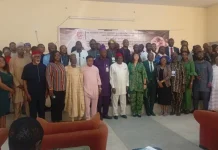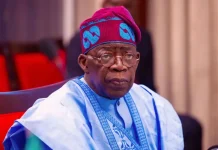President Muhammadu Buhari said that the events in Mali reiterate the need to revisit the importance of the protection of the people’s right to choose freely the form of government they want.
He said this at the 59th Ordinary Session of the Authority of Heads of State and Government of ECOWAS in Accra, Ghana.
The president noted that democracy in the West African sub-region “continues to develop”, calling for the repositioning of Mali following the coup that ousted its former president, Ibrahim Boubacar Keïta by a military junta.
Buhari said, “At this Summit today, we are expected to review a number of important reports dealing with various issues of concerns to our organisation and people. In doing so, we must take realistic and practical decisions which will positively impact our citizens.
“Some of those decisions, necessarily will have to do with evolving political and security situations in our sub-region as well as evaluate the health of our organisation with the hope of repositioning to serve our people and sub-region better.
READ ALSO: Improve Quality of Service, Reduce Data Price, Buhari Tells MTN
“While democracy continues to develop in our sub-region, recent events in Mali are sad reminders that vigilance remains a crucial imperative to protect people’s aspirations to freely choose the form of government they want.
“Pressures are needed to ensure that the transition process in Mali, which is halfway to its conclusion, is not aborted.
“A further slide in Mali could prove catastrophic to the Sub-region, considering that about half of that country is unfortunately under the grip of terrorists.
“I urge our organization to remain engaged with all stakeholders in Mali through our astute Mediator, former President Goodluck Jonathan, who, I congratulate warmly, for his untiring efforts thus far.
“I encourage him to sustain these efforts to ensure that the transition is completed as scheduled.”
In August 2020, Mali experienced its second coup in nine years, when a faction of its armed forces started an insurrection leading to the detainment of some of Mali’s top government officials including the Keita, the then-president.
Prior to the coup, Malians spilled into the streets demanding the resignation of Keita over the country’s enduring insurgency, corruption, and the handling of the COVOD-19 pandemic, inlcuding a shaky economy.












